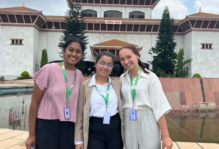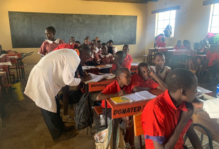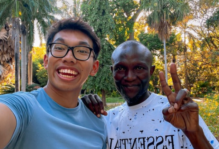Engaging with Neglected Conflicts: My Summer Advocating for Africa with Amnesty International
By Abigail Taylor ’24
The Global Research Institute’s Summer Fellows Program provides international experiential learning opportunities to W&M students. This post is one installment of a series highlighting the 2023 Fellows’ key discoveries and formative experiences.
I started work in Washington D.C. 51 days after the conflict in Sudan broke out. When I left Amnesty International, fighting between the Rapids Support Forces (RSF) and Sudanese Armed Forces (SAF) had caused four million Sudanese people to flee their homes. As the Africa Advocacy intern, it was my job to help bring attention to this conflict and other human rights crises in Sub-Saharan Africa. However, it is often difficult to get policymakers and the public to engage with a continent that can seem worlds away.

August 9, 2023: Me in front of the Amnesty logo at the Amnesty International D.C. office.
On April 15, 2023, fighting broke out between the RSF and SAF. Disagreements over incorporating the paramilitary RSF under the army caused the breakdown of a fragile alliance. Only two years earlier, leaders of both forces collaborated to oust civilian Prime Minister Abdalla Hamdok. To many, Hamdok represented the hope of a democratic government after decades of rule by President al-Bashir.
The Save Darfur movement gained traction in the early 2000s as the public learned about atrocities in the region. However, many don’t realize that these atrocities are set to repeat themselves in modern-day Sudan. On August 3rd, Amnesty International published a report documenting human rights violations and war crimes committed by the SAF and RSF. These violations included ethnically-motivated killing and gender-based violence.
As an intern in the government relations unit, I drafted advocacy letters that Amnesty members could send to their representatives in Congress. One of Amnesty’s recent policy objectives is to encourage the U.S. government to extend the arms embargo on Darfur to the rest of the country. This measure is intended to protect civilians, who have been caught in the crossfire and at times have been specifically targeted.
Throughout the summer, I also wrote briefings on current events and Africa-related hearings to keep Amnesty’s Africa co-group updated. Coverage of African issues is not a priority for most mainstream news sources, so I also sifted through tweets and other social media sources to get the most up-to-date information. Human rights organizations lobby policymakers with the power of information, not money, to advocate their agendas. This means that having the most current information on unfolding events is the only way to enact change.

July 24, 2023: On the Hill to meet with House staffers on the House Foreign Relations Committee to discuss the Sudan conflict.
Working in government relations also means facilitating meetings between policymakers and members of civil society. In July, I attended one such meeting on Capitol Hill. Watching staffers from the House Foreign Relations Committee engage with leaders of Sudanese non-profit organizations was fascinating. It was sobering to hear their stories, as many of the participants had family in Sudan whom they had not heard from since the fighting began.
Much of my work this summer pertained to the Sudanese conflict, and I chose to conduct an independent project on gender-based violence (GBV) in the country. At William & Mary, I have had the opportunity to conduct public health research, so I thought studying GBV from a public health perspective would be the perfect fit for me. I attended think-tank events, studied international humanitarian law, and used a case-study approach to inform a paper and brown bag presentation I gave at the end of my internship.

July 19, 2023: Attending an event at USIP called Russia in Africa: The Wagner Group, Russia-Africa Summit and Beyond.
Working in our nation’s capital also allowed me to hear from some of the best and brightest foreign policy experts in our country. I made good use of my SmarTrip card and attended events at the Carnegie Endowment for International Peace, the Stimson Center, the United States Institute of Peace, and the Open Society Foundations. I even kept a spreadsheet ranking the snacks I sampled at each event. One of my favorite DC errands was hand-delivering a letter to an African embassy on behalf of Amnesty International.
Talking about my time at Amnesty would be incomplete without mentioning my amazing colleagues. My incredible boss, Kate Hixon, a W&M grad, gave me many opportunities to attend high-level meetings and mentored me through my independent project. I was also lucky enough to share a cubicle with fellow W&M student and intern Elijah Tsai. All of my coworkers made Amnesty such a special place, and I cannot thank them enough for welcoming me into their office. Together, we tried local DC restaurants Little Sesame and Immigrant Food (both of which I would highly recommend trying).
On a more serious note, the conflict in Sudan continues today, and it is one of many neglected crises. Fighting in the Eastern DRC has killed 6 million people since the 1990s. Millions in Ethiopia experience violations of their human rights as well as extreme hunger. Unfortunately, these crises rarely make the front page of US newspapers. Groups like Amnesty ensure that the people of these countries are not forgotten. While change is slow and difficult, learning and talking about these issues is the first step. This summer, I learned a toolkit for engaging with human rights issues in Africa, and I look forward to continuing on that path.
Growing up five miles from D.C., I figured I knew the city pretty well. However, this summer was the first time I truly appreciated the District. Seeing the motorcade pass by or walking down Embassy Row will remind you that monumental decisions are made every moment. Politics can be a tumultuous and frustrating field, but it can also be rewarding. Despite working on such heavy topics, the people of Amnesty International never failed to make me laugh. I could not have asked for a better internship experience.




No comments.
Comments are currently closed. Comments are closed on all posts older than one year, and for those in our archive.